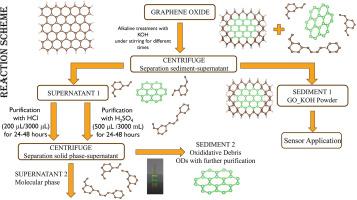Optical investigation of degradation of graphene oxide in alkaline environment: Evidence of two distinct photon-emitting phases in visible region.
IF 3.1
Q2 MATERIALS SCIENCE, MULTIDISCIPLINARY
引用次数: 0
Abstract
In this work we show a procedure of treating of the graphene oxide in alkaline environment as a function of the treatment time in order to obtain novel structures with strong luminescence properties, water-stable, useful as potential replacement for critical raw materials employed as example in optical and optoelectronic devices or for diagnostic and therapeutic technology. These structures have distinct blue and green-luminescence properties which derived most likely from different structural conformations, one associable with that of carbon quantum dots (or as an alternative to that of the Oxidative Debris), the other, lighter and more similar to organic compounds, reported in literature as fulvic-like molecules, but whose nature has to be further investigated. We show that the lighter fraction has a dual mechanism of photoemission: the excitation-independent PL for excitation wavelength within 350 nm and the excitation-dependent component for excitation wavelength ranging in the visible spectrum. The PL dual behaviour could depend on fluorescent nanoclusters composed by specific organic fluorophores with a carbonaceous core. FTIR analysis shows reasonably the same functional groups unless of some difference discussed in the text, meanwhile UV–Vis and PL analysis clearly highlight two distinct emissions (450 nm and 530 nm) in the visible region of the electromagnetic spectrum. Excitation-dependent photoluminescence, water stability and organic fluorescent nanostructures are issues particularly required for application in the biological field but also in materials science.

碱性环境中氧化石墨烯降解的光学研究:可见光区域两种不同光子发射阶段的证据。
在这项工作中,我们展示了一种在碱性环境中处理氧化石墨烯的方法,该方法是处理时间的函数,目的是获得具有强发光特性的新型结构,这种结构在水中稳定,有可能替代光学和光电设备或诊断和治疗技术中使用的关键原材料。这些结构具有不同的蓝色和绿色发光特性,很可能来自不同的结构构象,其中一种与碳量子点的结构构象有关(或可替代氧化碎片的结构构象),另一种较轻,更类似于有机化合物,文献报道为富勒烯类分子,但其性质还有待进一步研究。我们的研究表明,较轻的部分具有双重光发射机制:在激发波长为 350 纳米以内时,具有与激发无关的光致发光特性;在可见光谱范围内,具有与激发有关的光致发光特性。光致发光的双重特性可能取决于由特定有机荧光团和碳质核心组成的荧光纳米团簇。傅立叶变换红外光谱分析显示出相同的官能团,但文中讨论的某些差异除外,而紫外可见光和聚光分析则清楚地显示出电磁波谱可见光区的两种不同发射(450 nm 和 530 nm)。与激发有关的光致发光、水稳定性和有机荧光纳米结构是生物领域和材料科学应用中特别需要解决的问题。
本文章由计算机程序翻译,如有差异,请以英文原文为准。
求助全文
约1分钟内获得全文
求助全文
来源期刊

Carbon Trends
Materials Science-Materials Science (miscellaneous)
CiteScore
4.60
自引率
0.00%
发文量
88
审稿时长
77 days
 求助内容:
求助内容: 应助结果提醒方式:
应助结果提醒方式:


